#geekdom
Explore tagged Tumblr posts
Text
GENDER STUDIES is out now! 🎉
A comic treatment of the challenges, complexities, and occasional absurdity of life at the crossroads of race, gender, and geekiness.
#ajuan mance#artists on tumblr#black artists on tumblr#new books#graphic novel#gender studies#gender stuff#queerness#gender critical#queer stuff#qwoc#black qwoc#black and queer#black artists#blackartists#black tumblr#queer tumblr#lgbtqia#lgbtq community#geek#geek girl#geekdom#geeking out
72 notes
·
View notes
Text

153 notes
·
View notes
Text
Guys complaining about alleged "Girl Bosses" would not have survived the late 90s to early 2000s.
Hell, not even the eighties when there were a growing amount of girl characters taking sh*t and taking names. There might've been concessions in their characters arc in pertaining to men buuuuuut a whole lot of them from those decades would've cheesed off the Status Quo Warriors of today.
Back in my day, they were called Strong Female Characters(TM) by overcompensating male writers. None of this same stuff but different labels.
#women in fiction#female characters#strong female characters#girlboss#girl boss#hashtag girlboss#status quo warriors#geek discourse#geekdom#geekdom nonsense
19 notes
·
View notes
Text
Working on a pattern for a tea cosy
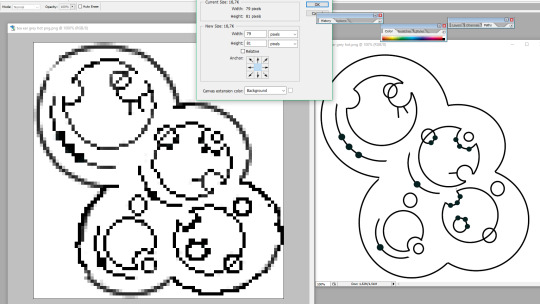
9 notes
·
View notes
Text
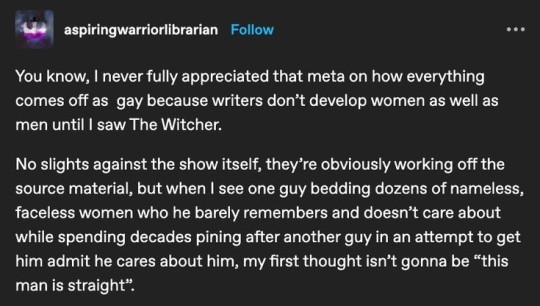
#radical feminism#geekdom#geekery#writing women characters#and that's why all the men in fiction are gay#i suppose#one of these days I'm going to write an essay detailing the way men view men vs how men view women colors the way they write relationships
16 notes
·
View notes
Text
As an older geek, from the time when a lot of geeky hobbies were niche, it's always fun watching wider audiences discover things for the first time.
Example: Baldur's Gate 3 and Tieflings.
#dnd#geekdom#baldur's gate 3#I'm glad they enjoy it so much#just funny when it's old hat for you#anyone remember Planescape: Torment?#Annah
5 notes
·
View notes
Text
Summer's Gone
The grandson came for the summer. Three weeks with an eight-year-old. I’m still bloody exhausted, but we squeezed every bit of joy from it. We are all geeks here. It’s wall-to-wall Star Wars, Star Trek, Harry Potter, (before she-who-must-not-be-named went off the deep end). We’ve had Pokémon, Magic the Gathering, Dungeons and Dragons, Disney, Witchy, and Slaying all over the shop and that’s…
#Doctor Who#fandom#geekdom#geekhood#Grandkids#grandparenting#passing on tradition#sharing#Wales#Whoniverse
1 note
·
View note
Text
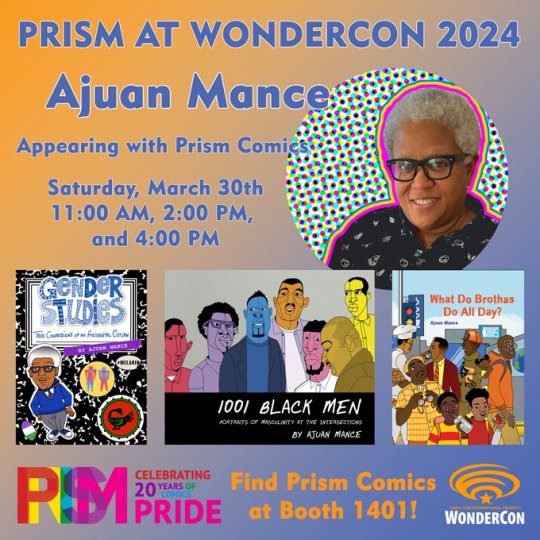


Here's where I'll be at WonderCon ✨ Hope to see you there!
#wondercon#wondercon 2024#ajuan mance#prism comics#comics#black artist#cartoonist on tumblr#black comics#latinx artist#black artists on tumblr#black artists#scifiart#sci fi and fantasy#geek#geekdom#qwoc#black qwoc
2 notes
·
View notes
Text
So I met my college roommate eleven years ago over a conversation about group nouns at summer orientation. Specifically the group noun best used for unicorns as our section leader for orientation day so creatively dubbed our group the unicorn herd. The only thing more obnoxious than the unicorn triteness—to a pair of well read fantasy nerds—was the banality of ‘herd.’ And fortunately our muttering to this effect resulted in a consensus that ‘a sparkle of unicorns’ was more fitting to the obnoxiously-pastel-rainbow-commercialized-beasts-of-legend than ‘herd’ could ever hope to be and that at least one other person in this random sampling of teenaged humanity had wit and sense.
To this day group nouns and other bits of fantastic word play are a vital part of how our friendship works. Today we discussed group nouns which might apply to ourselves.
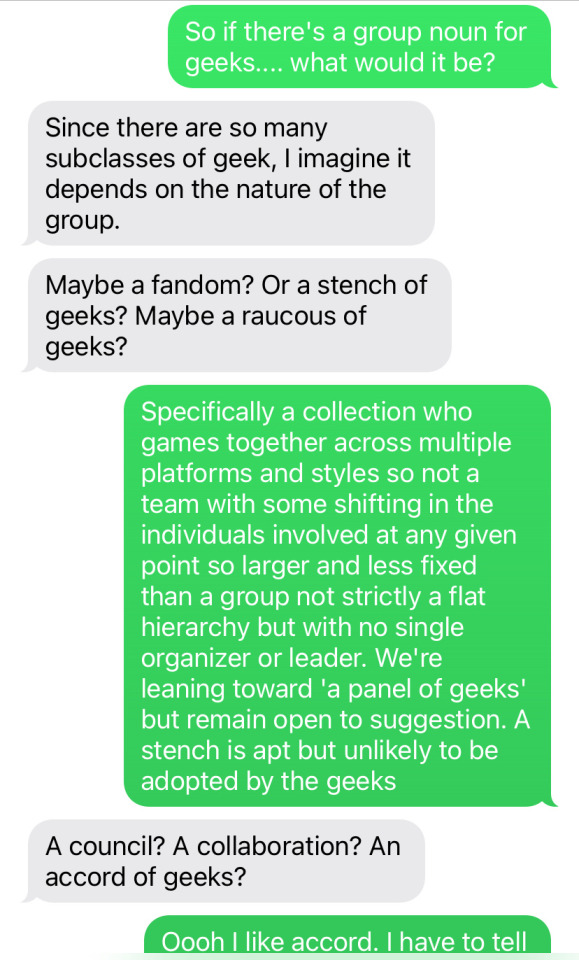
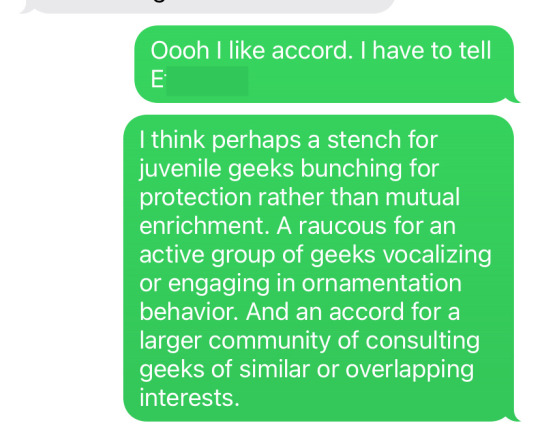
1 note
·
View note
Text
If you don't know me by now
Hey there to all who stumble upon my blog! I'm Sophie, I run the "All Signs Point to Sunnydale" Tumblr blog. A place to share all of the best parts and my opinions on the seasons of Buffy and (when I get around to it) Angel.
This isn't just limited to season recaps, this could be anything, it could be memes, fashion faux pas and clothing choices that have stood the test of time. Those chunky highlights that Buffy had in S3, and the little fringe, the less said about that the better. Anything Buffy related, I will repost and give full credit to the people who originally made it.
You can also find me on my personal blog: @plasmag3ist-blog or on the Buffy Boards, I'm semiurge on there!
1 note
·
View note
Text
Something else
I feel when it comes to studies on what makes somebody a geek pointing out to rather unexpected factors, it seems it’s one thing to be smart and another to be autistic but the geek mindset is something else altogether. According to one interesting mid-2010s study, what makes somebody a geek is a recipe consisting of apophenia (tendency to see patterns), extraversion (tendency to be outgoing and sociable), narcissism (really inflated self-esteem), neuroticism (tendency to be moody), openness to experience (open-mindedness, though not so much on intellect) and surprisingly not so high on crytallised intelligence, or the tendency to gain knowledge over time.
So judging by the study’s criteria, what makes somebody a geek isn’t what most people think it is. This leads to an interesting corollary that at least non-geeks might be smarter than one realises, especially if this involves both crystallised and fluid intelligence. Fluid intelligence being the tendency to come up with novel solutions to any situation, so fields like nursing may require both crystallised and fluid intelligence in the sense of both learning about each and every disease, ailment and cure and finding out ways to cure or heal somebody on the go. Or the odd possibility that just because somebody is smart and scientifically inclined doesn’t mean they’re necessarily nerdy, going by the study’s parametres.
If this is true and something not many have considered nor understood, then it becomes more telling that when there are scientists who have little to no connection to geek culture in any way (judging by the blogs they write) it seems the association of geekiness with intellect starts to fade away. Admittedly what they write online isn’t always indicative of what they do offline, but if you are what you eat then it becomes telling that when they don’t delve any deeper into geek culture themselves then they’re not really geeks. The sort of sciences that are really popular with the masses tend to be biology, psychology, anthropology, sociology and astronomy.
If because not only are they practical and/or easily observable, but that they’re also more relatable and understandable in some way. But then again this means sometimes a normie who stargazes a lot and shows some knowledge of the solar system might just be a really smart normie, especially if their involvement in geek culture is so shallow to begin with. An athlete who moonlights as a scientist but doesn’t read that much comics and speculative fiction might just be a really smart athlete, likewise I know one geek who admits having difficulty reading academia and another admits to not being this smart themselves.
So these examples, especially the last two, prove the study’s point right. If not all geeks are really this intelligent, despite their love of obscure trivia then the geek mindset is something else altogether. Geeks seem more intelligent than everybody else not just due to the accidental conflation of being academically inclined with being into comics and science fiction (at least in the west), but also how and why geeks have a thing for obscure trivia. If not all geeks are this smart, nor are they into the sciences then the geek mindset is really a different beast. It does shed light on what makes somebody a geek, albeit not for the reasons you think it is.
Maybe that’s why so many geeks hate The Big Bang Theory, it’s a programme that really doesn’t get geeks as they are. Not to mention, many geeks tend to gravitate towards cult programmes a lot that explains why no matter how hard TBTT tries to appeal to them, it really doesn’t get the real ins and outs of geek culture. Perhaps what I realised about geek culture and this study are any indication, geekdom isn’t what you think it is. If not all geeks are into the sciences nor are they autistic, then the geek mentality is another creature altogether.
3 notes
·
View notes
Text


Here’s my personal recommendation of a YouTube channel to check out:
#nerdy stuff#tumblr recommendations#recommend#recommendation#youtube#youtube content#youtube recommendations#youtube video#video recommendation#youtube link#youtube links#youtube channel#science fiction#scifi#black youtuber#support YouTube creators#geek#geekdom#science fiction books#nerdy videos#scifi videos#black content creator#black nerd#nerdout!#many a true nerd
1 note
·
View note
Text
NtG is on indefinite hiatus due to life.
Unfortunately, it's not viable to keep paying for podcast hosting when there's nothing coming out, so I don't have anywhere for you to listen to our past episodes right now. I hope to find a hosting site that will let us post our handful of eps for posterity's sake indefinitely and for free. (Suggestions are welcome)
In the meantime, if you liked the episodes and you want more of Andromeda's style of film discourse (and squee), you might give my film blog, The Lost Title Cards a try. I actually started that before Heather and I started the podcast, and I'm thinking about returning to it.
In it, I do my usual brand of infodump: random esoteric symbolism coupled with conversational thematic discussion of my favorite things about a film or series, sometimes egregiously researched and liberally sprinkled with excessively ecstatic exhortations (a.k.a. 'squee'). And yeah, I use words like 'exhortations' and unconsciously commit allliterative crimes. I also say things like, "totally fucking awesome" and leave some offside comments in parentheses.
I'm thinking of doing a treatment--either condensing or expanding--on some of our favorite episodes (like Captain America and Spaced) in written form.
And I have a shitload of new ideas I'll eventually get around to.
It will likely be a while before I start posting new stuff. But you can check out some of my earlier posts, such as my MCU Infinity Saga Recap leading up to Infinity Wars and Endgame (I need to finish my thoughts on those last couple of films; if you're eager to see them, let me know, and I'll move them up the list), the M. Night Shyamalan Eastrail 177 trilogy, my "Behind the Screen" series (more of those to come), and my seasonal watch lists.
Also, if you like art, you should check out Heather's @heathertomasello page, here and also on Instagram/Facebook.
Thanks for joining in, y'all!
#fandom#pop culture#geekdom#geeklife#podcasts#blogging#film discussion#Captain America#m night shyamalan#seasonal movies#mcu
1 note
·
View note
Text
Unmasking the Supernatural World of Kolchak: The Night Stalker
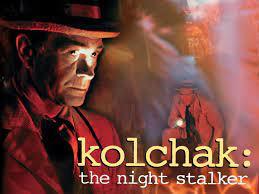
Decades before shows like The X-Files, Supernatural, and Grimm brought monsters-of-the-week to the small screen, there was Kolchak: The Night Stalker. This short-lived 1970s series followed monster-hunting newspaper reporter Carl Kolchak as he investigated supernatural threats hiding in the shadows of modern-day Chicago.
Though it only aired for one season on ABC, Kolchak left an undeniable impact on network television and the horror/sci-fi genres. With its dark tone, witty lead character, and episodic paranormal stories, the show introduced key tropes that inspired future programs to embrace tales of vampires, robots, and UFOs. On the 45th anniversary of its debut, it’s time to revisit why Kolchak remains a cult favorite and seminal influence.
The Made-for-TV Films That Started It All
Kolchak’s origins begin with The Night Stalker, an ABC made-for-TV movie that aired in 1972. The film was penned by acclaimed sci-fi/horror writer Richard Matheson, who adapted an unpublished novel titled The Kolchak Papers. It featured Darren McGavin as Carl Kolchak, a reporter for the Independent News Service who investigates a string of Las Vegas murders committed by a modern-day vampire.
The Night Stalker was the highest-rated TV movie at the time with an unprecedented 33.2 rating. This smash success led ABC to quickly commission a sequel film, 1973’s The Night Strangler. Set in Seattle, this second movie saw Kolchak uncover a 146-year old alchemist extracting glandular fluids to stay alive. Both 90-minute films were ratings hits for ABC due to their supernatural hooks and McGavin’s performance as the persistent, quick-witted reporter willing to battle monsters.
Shifting to a Weekly Series in Primetime
Buoyed by the success of the Kolchak TV movies, ABC made the pivotal decision to order a third iteration as a weekly series. Simply titled Kolchak: The Night Stalker, the show premiered on September 13, 1974. It transplanted the Kolchak character from Seattle to Chicago and expanded the threats beyond vampires and alchemists.
While maintaining the core DNA of McGavin’s dogged reporting and dark monster themes, the series took an episodic, X-Files-esque approach with weekly supernatural adversaries. Over 20 episodes, Kolchak faced off against a diverse array of creatures like zombies, Jack the Ripper, a rakshasa, and even a robot assassin. He reported for the independent INS wire service, narrating his investigations in trademark hardboiled fashion.
The weekly format also introduced a regular supporting cast like Kolchak’s editor Tony Vincenzo (played by Simon Oakland). Despite its loyal following, Kolchak: The Night Stalker struggled in the ratings against programs like Sanford and Son and Chico and the Man. ABC declined to order a second season, while tying up the major storyline threads in the final episode.
Why the Show Became a Cult Favorite
Though short-lived as a series, Kolchak: The Night Stalker had an outsized impact that led to its eventual status as a cult classic. Carl Kolchak stepped directly from the pages of 1930s pulp fiction with his straw hat, seersucker suit, and refusal to let authority figures deter him from getting his scoop.
Darren McGavin fully embodied the role and gave it a layer of humor with his deadpan narration and quippy reactions to being fired on a regular basis. Kolchak feverishly typed away at his articles on a worn-out typewriter, determined to reveal the truth no matter the personal cost. His quest spoke directly to viewers who felt marginalized or dismissed in society.
The monsters themselves tapped into horror and sci-fi themes that the 1970s public was eager to see, from occult legends like the djinn to Creature from the Black Lagoon-style swamp beasts. ABC took a major risk bringing a genre program like Kolchak to their primetime lineup, paving the way for future series.
Legacy of a Genre Trailblazer
Though ratings struggled in its initial run, Kolchak: The Night Stalker turned out to be shockingly ahead of its time. It helped break major ground in bringing horror and supernatural themes to network television. Following Kolchak’s cue, ABC debuted sci-fi shows like The Six Million Dollar Man and The Bionic Woman in quick succession.
The “monster-of-the-week” episodic approach pioneered by the show became a staple of future programs like The X-Files, Buffy the Vampire Slayer, and Fringe. Kolchak also popularized now-standard tropes like government UFO cover-ups, investigations of creatures hiding in plain sight, and paranormal journalism. Without Carl Kolchak’s odyssey, we may never have gotten to ride along with paranormal sleuths like Fox Mulder, the Winchester brothers, or Grimm’s Nick Burkhardt.
From the underground tunnels to dark alleys of Chicago, the show developed an aesthetic that became foundational for urban-set genre series. Traits like narration, morgue visits, and twisting stairs influenced everything from The X-Files to Evil.
The series memorably played on viewer “fear of the unknown” in the shadows of the everyday world. As Kolchak relentlessly chased down ghosts, witches, and serial killers, he showed it was possible to face the darkness with courage and wit.
Kolchak's Enduring Pop Culture Legacy
Though it went off the air in 1975 after just one 20-episode season, Kolchak: The Night Stalker continued finding new audiences through syndication and strong word-of-mouth. Darren McGavin reprised the role in two short-lived sequels – a 2005 TV movie on ABC and a short-lived 2008 series called Night Stalker. Neither quite captured the magic of the original.
Kolchak remains a highly influential part of pop culture, getting referenced in shows from The Simpsons to The X-Files. The character even appears in the novel Ready Player One, described as an “obscure 1970s TV character that only the most diehard geeks seem to remember.”
But those who do remember Kolchak hold the show close as a nostalgic gem full of monsters, mystery, and Carl’s determined reporting spirit. On the 45th anniversary of its debut, Kolchak: The Night Stalker deserves appreciation as a cult favorite that brought ghouls and dark supernatural themes to primetime. Through writers like Chris Carter and Joss Whedon, Carl Kolchak’s legacy shines on in today’s era of small-screen monster hunting.
Check out the original: https://www.amazon.com/gp/video/detail/B000X2FVA4/ref=atv_dp_share_cu_r
0 notes
Text

ICYMI GENDER STUDIES is out now! ➡️ https://bit.ly/GendStudies
A comic treatment of the challenges, complexities, and occasional absurdity of life at the crossroads of race, gender, and geekiness.
#gender stuff#gender ideology#genderqueer#gender critical#gender studies#ajuan mance#black artists on tumblr#geek#geekdom#Black geek#black artists#artists on tumblr#qpoc#black qwoc#black qpoc#black artist#oakland#zine#rosarium
1 note
·
View note
Text




Cosmo who? Its all about
💕✨Juandissimo Magnifico✨💕
Since we aren’t going to ThyGeekdom Con this year, I wanted to show one of the quickest easiest cosplays I’ve ever made.
We didn’t get to run around in it much, but they ended up being my absolute favorite.
Cant wait to wear them again, maybe when my hair is longer for a bigger pink fro cuz I dont know how to Wig very well 😅
#fairly oddparents#nickelodeon#juandissimo magnifico#cosmo and wanda#thoughts about cosplays so i don’t forget#cosmo who#Thy Geekdom Con
9 notes
·
View notes